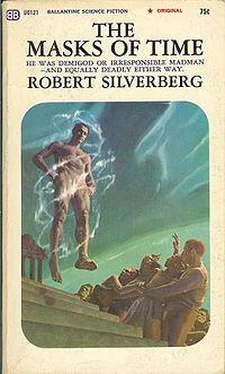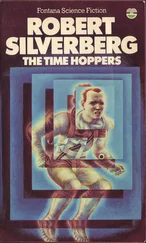Robert Silverberg - The Masks of Time
Здесь есть возможность читать онлайн «Robert Silverberg - The Masks of Time» весь текст электронной книги совершенно бесплатно (целиком полную версию без сокращений). В некоторых случаях можно слушать аудио, скачать через торрент в формате fb2 и присутствует краткое содержание. Год выпуска: 1968, ISBN: 1968, Издательство: Ballantine Books, Жанр: Фантастика и фэнтези, на английском языке. Описание произведения, (предисловие) а так же отзывы посетителей доступны на портале библиотеки ЛибКат.
- Название:The Masks of Time
- Автор:
- Издательство:Ballantine Books
- Жанр:
- Год:1968
- ISBN:0345234464
- Рейтинг книги:3 / 5. Голосов: 1
-
Избранное:Добавить в избранное
- Отзывы:
-
Ваша оценка:
- 60
- 1
- 2
- 3
- 4
- 5
The Masks of Time: краткое содержание, описание и аннотация
Предлагаем к чтению аннотацию, описание, краткое содержание или предисловие (зависит от того, что написал сам автор книги «The Masks of Time»). Если вы не нашли необходимую информацию о книге — напишите в комментариях, мы постараемся отыскать её.
The Masks of Time — читать онлайн бесплатно полную книгу (весь текст) целиком
Ниже представлен текст книги, разбитый по страницам. Система сохранения места последней прочитанной страницы, позволяет с удобством читать онлайн бесплатно книгу «The Masks of Time», без необходимости каждый раз заново искать на чём Вы остановились. Поставьте закладку, и сможете в любой момент перейти на страницу, на которой закончили чтение.
Интервал:
Закладка:
Aster said quietly, “It was amusing.”
She offered no details. I could see Fields bursting to know if she had been to bed with Vornan-19. It seemed a moot point to me; our guest had already demonstrated a remarkable and indiscriminate sexual voracity, but on the other hand Aster appeared well able to guard her chastity even from a man she had bathed with. She looked cheerful and relaxed and not at all as though she had suffered any fundamental violation of her personality in the last three hours. I rather hoped she had slept with him; it might have been a healthy experience for her, cool and isolated woman that she was.
Kralick arrived a few minutes later, Vornan-19 in tow. He led us all to the roof heliport, where the copters were waiting. There were four of them: one for the six members of the news pool, one for the six of us and Vornan, one for a batch of White House people, and one for our security guard. Ours was the third to take off. With a quiet whir of turbines it launched itself into the night sky and sped northward. We could not see the other copters at any time during the flight. Vornan-19 peered with interest through his window at the glowing city beneath.
“What is the population of this city, please?” he asked.
“Including the surrounding metropolitan area, about thirty million people,” said Heyman.
“All of them human?”
The question baffled us. After a moment Fields said, “If you mean, do any of them come from other worlds, no. We don’t have any beings from other worlds on Earth. We’ve never discovered any intelligent life forms in this solar system, and we don’t have any of our star probes back yet.”
“No,” said Vornan, “I am not talking about otherworlders. I speak of natives to Earth. How many of your thirty million here are full-blood human, and how many are servitors?”
“Servitors? Robots, you mean?” Helen asked.
“In the sense of synthetic life-forms, no,” said Vornan patiently. “I refer to those who do not have full human status because they are genetically other than human. You have no servitors yet? I have trouble finding the right words to ask. You do not build life out of lesser life? There are no— no—” He faltered. “I cannot say. There are no words.”
We exchanged troubled glances. This was practically the first conversation any of us had had with Vornan-19, and already we were wallowing in communication dilemmas. Once again I felt that chill of fear, that awareness that I was in the presence of something strange. Every skeptical rationalist atom in my being told me that this Vornan was nothing but a gifted con-man, and yet when he spoke in this random way of an Earth populated by humans and less-than-humans, there was powerful conviction in his groping attempts to explain what he meant. He dropped the subject. We flew onward. Below us the Hudson wound sluggishly to the sea. In a while the metropolitan zone ebbed and we could make out the dark areas of the public forest, and then we were descending toward the private landing strip of Wesley Bruton’s hundred-acre estate, eighty miles north of the city. Bruton owned the largest tract of undeveloped privately held land east of the Mississippi, they said. I believed it.
The house was radiant. We saw it from a distance of a quarter of a mile as we left the helicopters; it breasted a rise overlooking the river, shining with an external green light that sent streams of brightness toward the stars. A covered glidewalk carried us up the grade, through a winter garden of sculptured ice, tinted fantasies done by a master hand. Coming closer, we could make out Ngumbwe’s structural design: a series of concentric translucent shells comprising a peaked pavilion taller than any of the surrounding trees. Eight or nine overlapping arches formed the roof, revolving slowly so that the shape of the house continually changed. A hundred feet above the highest arch hung a great beacon of living light, a vast yellow globe that turned and writhed and swirled on its tenuous pedestal. We could hear music, high-pitched, vibrant, coming from festoons of tiny speakers draped along the icy limbs of gaunt, monumental trees. The glidewalk guided us toward the house; a door yawned like a mouth, gaping sideways to engulf us. I caught a glimpse of myself mirrored in the glassy surface of the door, looking solemn, a bit plump, ill at ease.
Within the house chaos reigned. Ngumbwe clearly was in league with the powers of darkness; no angle was comprehensible, no line met another. From the vestibule where we stood dozens of rooms were visible, branching in every direction, and yet it was impossible to discern any pattern, for the rooms themselves were in motion, constantly rearranging not only their individual shapes but their relation to one another. Walls formed, dissolved, and were reincarnated elsewhere. Floors rose to become ceilings while new rooms were spawned beneath them. I had a sense of colossal machinery grinding and clanking in the bowels of the earth to achieve these effects, but all was done smoothly and noiselessly. In the vestibule itself the structure was relatively stable, but the oval alcove had pink, clammy walls of skinlike material which swooped down at a sharp declivity, rising again just beyond where we stood, and twisting in midair so that the seamless surface was that of a Mцbius strip. One could walk that wall, pass the turnover point, and leave the room for another, yet there were no apparent exits. I had to laugh. A madman had designed this house, another madman lived in it; but one had to take a certain perverse pride in all this misplaced ingenuity.
“Remarkable!” Lloyd Kolff boomed. “Incredible! What do you think of it, eh?” he asked Vornan.
Vornan smiled palely. “Quite amusing. Does the therapy work well?”
“Therapy?”
“This is a house for the curing of the disturbed? A bedlam, is that the word?”
“This is the home of one of the world’s wealthiest men,” Heyman said stiffly, “designed by the talented young architect Albert Ngumbwe. It’s considered a landmark of artistic accomplishment.”
“Charming,” said Vornan-19 devastatingly.
The vestibule rotated and we moved along the clammy surface until abruptly we were in another room. The party was in full swing. At least a hundred people were clustered in a diamond-shaped hall of immense size and unfathomable dimensions; the din they made was fearful, although by some clever prank of acoustical engineering we had not heard a thing until we had passed the critical zone of the Mцbius strip. Now we were among a horde of elegant guests who clearly had been celebrating the night’s event long before the arrival of the guest of honor.
They danced, they sang, they drank, they puffed clouds of multi-hued smoke. Spotlights played upon them. I recognized dozens of faces in one dazzled sweep across the room: actors, financiers, political figures, playboys, spacemen. Bruton had cast a wide net through society, capturing only the distinguished, the lively, the remarkable. It surprised me that I could put names to so many of the faces, and I realized that it was a measure of Bruton’s success that he could gather under one multiplicity of roofs so many individuals that a cloistered professorial sort like myself could recognize.
A torrent of sparkling red wine flowed from a vent high on one wall and ran in a thick, bubbly river diagonally across the floor like water in a pig trough. A dark-haired girl clad only in silver hoops stood under it, giggling as it drenched her. I groped for her name and Helen said, “Deona Sawtelle. The computer heiress.” Two handsome young men in mirror-surface tuxedos tugged at her arms, trying to pull her free, and she eluded them to frolic in the flowing wine. In a moment they joined her. Nearby a superb dark-skinned woman with jeweled nostrils screamed happily in the grip of a titanic metal figure that was rhythmically clutching her to its chest. A man with a shaven and polished skull lay stretched full length on the floor while three girls scarcely out of their teens sat astride him and, I think, tried to undo his trousers. Four scholarly gentlemen with dyed beards sang raucously in a language unknown to me, and Lloyd Kolff strode across to greet them with whoops of mysteriously expressed pleasure. A woman with golden skin wept quietly at the base of a monstrous whirling construction of ebony, jade, and brass. Through the smoky air soared mechanical creatures with clanking metal wings and peacock tails, shrieking stridently and casting glittering droppings upon the guests. A pair of apes chained with loops of interlocked ivory gaily copulated near the intersection of two acute angles of the wall. This was Nineveh; this was Babylon. I stood dazzled, repelled by the excess of it all and yet delighted, as one is delighted by cosmic audacity of any kind. Was this a typical Wesley Bruton party? Or had it all been staged for the benefit of Vornan-19? I could not imagine people behaving like this under normal circumstances. They all seemed quite natural, though; it would take only some layers of dirt and a change of scene, and this could be an Apocalyptist riot, not a gathering of the elite. I caught sight of Kralick — appalled, he stood to one side of the vanished entrance, huge and bleak-faced, his ugly features no longer looking charming as dismay filtered through his flesh. He had not intended to bring Vornan into such a place.
Читать дальшеИнтервал:
Закладка:
Похожие книги на «The Masks of Time»
Представляем Вашему вниманию похожие книги на «The Masks of Time» списком для выбора. Мы отобрали схожую по названию и смыслу литературу в надежде предоставить читателям больше вариантов отыскать новые, интересные, ещё непрочитанные произведения.
Обсуждение, отзывы о книге «The Masks of Time» и просто собственные мнения читателей. Оставьте ваши комментарии, напишите, что Вы думаете о произведении, его смысле или главных героях. Укажите что конкретно понравилось, а что нет, и почему Вы так считаете.












